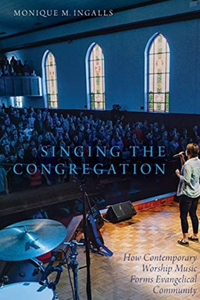Singing the Congregation
How Contemporary Worship Music Forms Evangelical Community
By Monique M. Ingalls
 Contemporary worship music shapes the way evangelical Christians understand worship itself. Author Monique M. Ingalls argues that participatory worship music performances have brought into being new religious social constellations, or "modes of congregating". Through exploration of five of these modes--concert, conference, church, public, and networked congregations--Singing the Congregation reinvigorates the analytic categories of "congregation" and "congregational music."
Contemporary worship music shapes the way evangelical Christians understand worship itself. Author Monique M. Ingalls argues that participatory worship music performances have brought into being new religious social constellations, or "modes of congregating". Through exploration of five of these modes--concert, conference, church, public, and networked congregations--Singing the Congregation reinvigorates the analytic categories of "congregation" and "congregational music."
Drawing from theoretical models in ethnomusicology and congregational studies, Singing the Congregation reconceives the congregation as a fluid, contingent social constellation that is actively performed into being through communal practice--in this case, the musically-structured participatory activity known as "worship." "Congregational music-making" is thereby recast as a practice capable of weaving together a religious community both inside and outside local institutional churches.
Congregational music-making is not only a means of expressing local concerns and constituting the local religious community; it is also a powerful way to identify with far-flung individuals, institutions, and networks that comprise this global religious community. The interactions among the congregations reveal widespread conflicts over religious authority, carrying far-ranging implications for how evangelicals position themselves relative to other groups in North America and beyond.